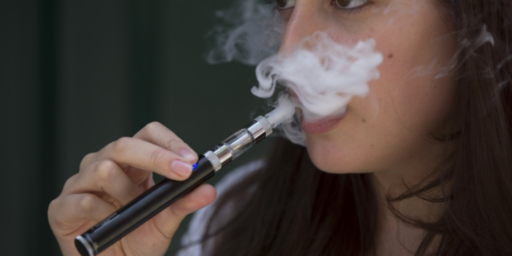POLITICAL ‘MARKET’
George Will has an excellent column explaining why Dean lost in Iowa and is almost surely not going to get the nomination:
Markets are mechanisms for generating and disseminating information. The term ”market failure” denotes instances when markets behave inefficiently, preventing optimal outcomes because of barriers that prevent new products from competing, or because consumers receive insufficient info about competing products. Iowa’s political market, called caucuses, where barriers to entry were negligible and information was abundant, worked well.
Like some other American arrangements (e.g., the Electoral College, judicial review), no deliberation planned Iowa’s system to function as it now does. But Monday night, the nation’s vetting of Democratic candidates began efficiently because a critical mass of information about Howard Dean had reached that state’s Democratic consumers. They responded by slowing the slide of the world’s oldest party toward nominating a political novelty unsuited to the national market.
Dean is a problematic product because the fuel that launched his rocket — a combustible brew of anger, pugnacity, moral vanity and intellectual condescension — severely limits the apogee of his trajectory. Television enforces intimacy with candidates and presidents — they are in America’s homes nightly. Many intense Democrats have had the fun of picnicking on Dean’s ideological red meat but are now flinching from the prospect of having, or of asking less-partisan Americans to have, prolonged intimacy with Dean’s sandpapery personality and equally abrasive agenda.
Exactly right.
The evidence from Iowa is sobering news for the White House. It is that the Democratic nominating electorate is serious about replacing George W. Bush. It understands that, come November, there would be many more Bush Democrats than Dean Republicans.
Yep.
Gephardt, the last practitioner of Franklin Roosevelt’s politics, is a good man. But because of the expansion of the middle class and social security (the condition, not the program) that FDR accelerated by means of broadened unionization, home ownership and Social Security, the blue-collar core of Gephardt’s support is too small a lever to move an election.
Ironic but likely correct.
The growing, aggressive portion of organized labor consists of white-collar government workers — government as interest group, another New Deal legacy. They never warmed to Gephardt but will have no trouble shifting to John Kerry, or to the sunniest candidate — John Edwards, the unDean, all smiles and no snarl.
Wesley Clark, who did not discover his Democratic allegiance until last September, is another matter. He awaits in New Hampshire. But with two real Democrats, Kerry and Edwards, showing strength — one of them with serious foreign policy and military experience — what rationale remains for Clark’s candidacy?
Good question.



I still think dean will win.
He’s GOT to win New Hampshire to have any chance now.